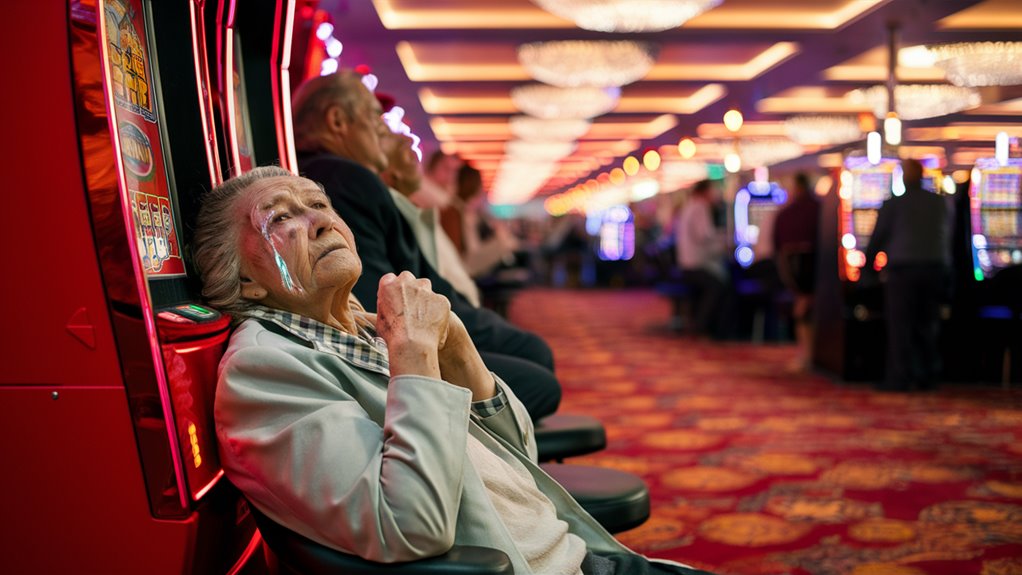
The Mind When We Bet

Wanting to gamble a lot starts when parts of the brain work together, making us really want to keep playing. The brain’s fun part gets very busy when we bet.
Changes in the Brain
The brain does not stay the same when we bet. Dopamine, the key brain juice that makes us feel good, fills us up when we win or almost win. At the same time, serotonin levels shift a lot, changing how we feel and choose.
How Casinos Trick Us
How casinos are made uses these brain shifts with: asting Lunar Calm Over Chaotic House Variance
- Paths like mazes
- Red lights
- Well-placed games
- No clocks or windows
- Non-stop noise
Brain’s Tricks
The brain’s tricks with memories make us keep betting by:
- Highlighting wins
- Forgetting losses
- Seeing fake links
- Thinking of almost-wins
Even pro betters who watch their games can get stuck by these mind tricks. If we know how our brains work, we can handle bad betting ways better.
How to Quit
Seeing what makes us want to bet and how our thoughts twist is the first strong step to break free from the grip of betting and keep safe habits.
The Fun Spot in the Brain
How the Brain’s Fun Spot Works in Betting
Main Brain Juices in Betting
How brain juices work is big in making betting addictive. Three key chemicals – dopamine, serotonin, and norepinephrine – power this fun brain spot during betting.
The Rush of Dopamine
When we bet, the brain sets off dopamine, making us feel happy and full of hope. This road for rewards works like what we see in other addictions, with even near-wins making dopamine buzz.
The brain’s fun center keeps our betting habits going with these chemical reactions, win or lose.
Serotonin and Feelings
Serotonin levels also move a lot when we bet. Winning more lifts serotonin, making us feel great and sure.
But, long betting times can drop serotonin, maybe making us feel sad or scared. Striking Hard From Soft Observations for Splitting Edge
Norepinephrine and Being Sharp
Releasing norepinephrine while betting makes the heart rush and focus sharp. This alert state keeps us sharp and fixed on betting longer.
The Brain and Betting Arty
The dance between these brain juices builds a cycle of rewards that feeds itself. The brain sees random wins as real skills, making a strong brain juice loop.
This cycle explains why we keep betting even when we lose money, as the brain’s fun system gets shaped by these mixed chemical acts.
Why Almost-Winning Holds Us
The Trick of Almost-Winning in Betting: Why We Can’t Stop

Brain Work in Near-Wins
Near-wins in betting make the brain light up like real wins do, in those spots that feel fun. Turning Ash-Draped Rival Scenes Into Playful Pot Gleams
When we nearly win – like when two signs match but not the third- the brain lets go of dopamine just like for real wins. This makes us want to play more even if we lose a lot.
Brain Bits and Happy Hints
Key brain bits, like the ventral striatum and insul, light up for near-wins. These bits, handling rewards and feeling choices, see near-wins as wins.
This makes a false reward feel where the brain thinks it’s getting good vibes even when we lose, messing up the usual learning that stops plans that do not give back.
Smart Game Ways and Near-Wins
Today’s betting games are made to play on this brain trick. Game designers set things up so near-wins happen about 12% of the time – far more than by chance.
This clever trick keeps players going and makes game times longer, pulling on the brain’s natural reward bits to keep us in, despite the losses.
Memory Tricks in Betting
Seeing Memory Tricks in Betting: The Science Look
Picking Memories in Betting
Research on the mind shows how gamblers remember their bets in a twisted way. 메이저사이트
Studies show that players often remember wins better than the losses, making their betting time seem different from the real stats. This bit, called availability twist, makes easy-to-remember events like wins seem more common than they are.
How Memory Twists Change Betting Ways
The brain’s lean to lift good times while hiding hard ones twists how we see our betting.


